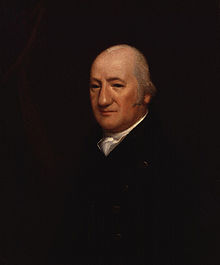Henry James Pye
Henry James Pye | |
|---|---|
 Henry James Pye, circa 1800-1808. | |
| Poet Laureate of the United Kingdom | |
| In office 28 July 1790 – 11 August 1813 | |
| Monarch | George III |
| Preceded by | Thomas Warton |
| Succeeded by | Robert Southey |
| Personal details | |
| Born | 20 February 1745 Magdalen College, Oxford |
| Occupation | Poet Laureate |
Henry James Pye (/paɪ/; 20 February 1745 – 11 August 1813) was an English poet, and Poet Laureate from 1790 until his death. His appointment owed nothing to poetic achievement and was probably a reward for political favours. Pye was merely a competent prose writer, who fancied himself as a poet, earning the derisive label of poetaster.
Life
Pye was born in London, the son of Henry Pye of Faringdon House in Berkshire, and his wife, Mary James. He was the nephew of Admiral Thomas Pye. He was educated at Magdalen College, Oxford. His father died in 1766, leaving him a legacy of debt amounting to £50,000, and the burning of the family home further increased his difficulties.[1]
In 1784 he was elected
Of all he wrote, his prose Summary of the Duties of a Justice of the Peace out of Sessions (1808) is most worthy of record. He was made poet laureate in 1790, perhaps as a reward for his faithful support of
As a prose writer, Pye was far from contemptible. He had a fancy for commentaries and summaries. His "Commentary on
He died in Pinner, Middlesex on 11 August 1813.[1] He is buried in Pinner's parish church of St John the Baptist.[5]
Pye married twice. He had two daughters by his first wife. He married secondly in 1801 Martha Corbett, by whom he had a son, Henry John Pye, who in 1833 inherited the Clifton Hall, Staffordshire estate of a distant cousin and who was High Sheriff of Staffordshire in 1840.
Works
- Prose
- - Summary of the Duties of a Justice of the Peace out of Sessions (1808)
- - The Democrat (1795)
- - The Aristocrat (1799)
- Poetry
- - Poems on Various Subjects (1787), first substantial collection of Pye's verse
- - Adelaide: a Tragedy in Five Acts (1800)
- - Alfred: An Epic Poem in Six Books (1801)
- Translations
- Plays
- - The Siege of Meaux (1794)
- - Adelaide (1800)
- - A Prior Claim (1805)
Notes
- ^ a b c d e Chisholm 1911.
- ^ Blake 1966, p. 110.
- ISBN 0521897556
- ^ Lesser Poets, 1790–1837
- ^ Weinreb, Ben; Hibbert, Christopher (1992). The London Encyclopaedia (reprint ed.). Macmillan. p. 745.
References
- OCLC 8047.
- A Genealogical and Heraldic History of the Commoners of Great Britain and Ireland John Burke (1835) pp 350–2 Google Books
- This article incorporates text from a publication now in the public domain: Chisholm, Hugh, ed. (1911). "Pye, Henry James". Encyclopædia Britannica. Vol. 22 (11th ed.). Cambridge University Press. p. 693.
External links
 Works by or about Henry James Pye at Wikisource
Works by or about Henry James Pye at Wikisource- Works by Henry James Pye at Open Library
